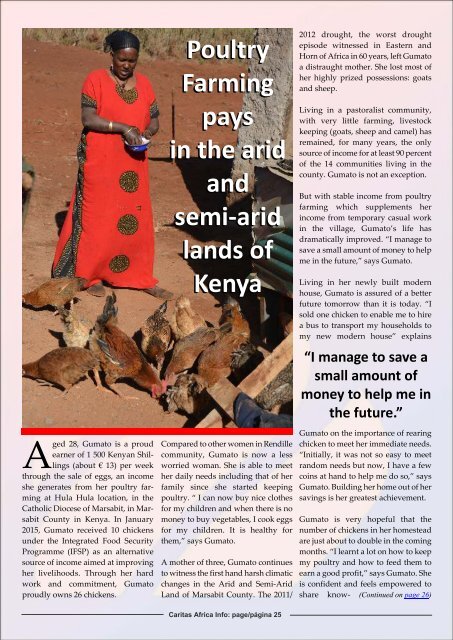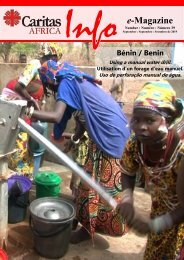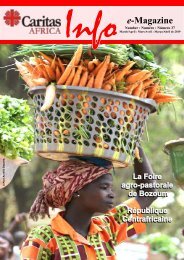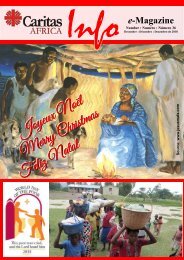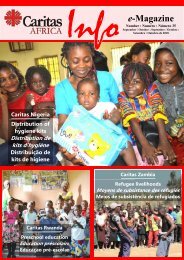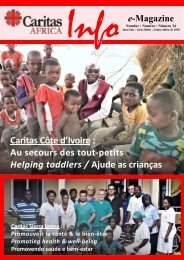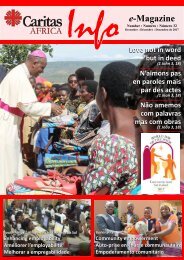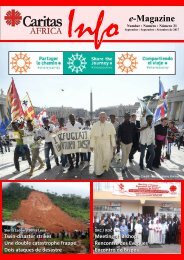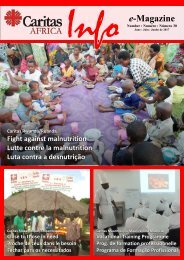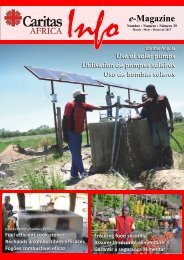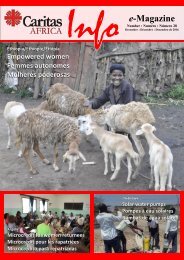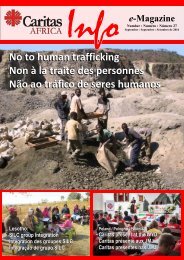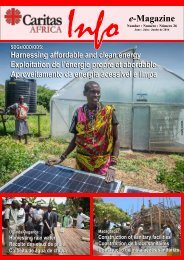Create successful ePaper yourself
Turn your PDF publications into a flip-book with our unique Google optimized e-Paper software.
Aged 28, Gumato is a proud<br />
earner of 1 500 Kenyan Shillings<br />
(about € 13) per week<br />
through the sale of eggs, an income<br />
she generates from her poultry farming<br />
at Hula Hula location, in the<br />
Catholic Diocese of Marsabit, in Marsabit<br />
County in Kenya. In January<br />
2015, Gumato received 10 chickens<br />
under the Integrated Food Security<br />
Programme (IFSP) as an alternative<br />
source of income aimed at improving<br />
her livelihoods. Through her hard<br />
work and commitment, Gumato<br />
proudly owns 26 chickens.<br />
Poultry<br />
Farming<br />
pays<br />
in the arid<br />
and<br />
semi-arid<br />
lands of<br />
Kenya<br />
Compared to other women in Rendille<br />
community, Gumato is now a less<br />
worried woman. She is able to meet<br />
her daily needs including that of her<br />
family since she started keeping<br />
poultry. “ I can now buy nice clothes<br />
for my children and when there is no<br />
money to buy vegetables, I cook eggs<br />
for my children. It is healthy for<br />
them,” says Gumato.<br />
A mother of three, Gumato continues<br />
to witness the first hand harsh climatic<br />
changes in the Arid and Semi-Arid<br />
Land of Marsabit County. The 2011/<br />
2012 drought, the worst drought<br />
episode witnessed in Eastern and<br />
Horn of Africa in 60 years, left Gumato<br />
a distraught mother. She lost most of<br />
her highly prized possessions: goats<br />
and sheep.<br />
Living in a pastoralist community,<br />
with very little farming, livestock<br />
keeping (goats, sheep and camel) has<br />
remained, for many years, the only<br />
source of income for at least 90 percent<br />
of the 14 communities living in the<br />
county. Gumato is not an exception.<br />
But with stable income from poultry<br />
farming which supplements her<br />
income from temporary casual work<br />
in the village, Gumato’s life has<br />
dramatically improved. “I manage to<br />
save a small amount of money to help<br />
me in the future,” says Gumato.<br />
Living in her newly built modern<br />
house, Gumato is assured of a better<br />
future tomorrow than it is today. “I<br />
sold one chicken to enable me to hire<br />
a bus to transport my households to<br />
my new modern house” explains<br />
“I manage to save a<br />
small amount of<br />
money to help me in<br />
the future.”<br />
Gumato on the importance of rearing<br />
chicken to meet her immediate needs.<br />
“Initially, it was not so easy to meet<br />
random needs but now, I have a few<br />
coins at hand to help me do so,” says<br />
Gumato. Building her home out of her<br />
savings is her greatest achievement.<br />
Gumato is very hopeful that the<br />
number of chickens in her homestead<br />
are just about to double in the coming<br />
months. “I learnt a lot on how to keep<br />
my poultry and how to feed them to<br />
earn a good profit,” says Gumato. She<br />
is confident and feels empowered to<br />
share know- (Continued on page 26)<br />
Caritas Africa Info: page/página 25


